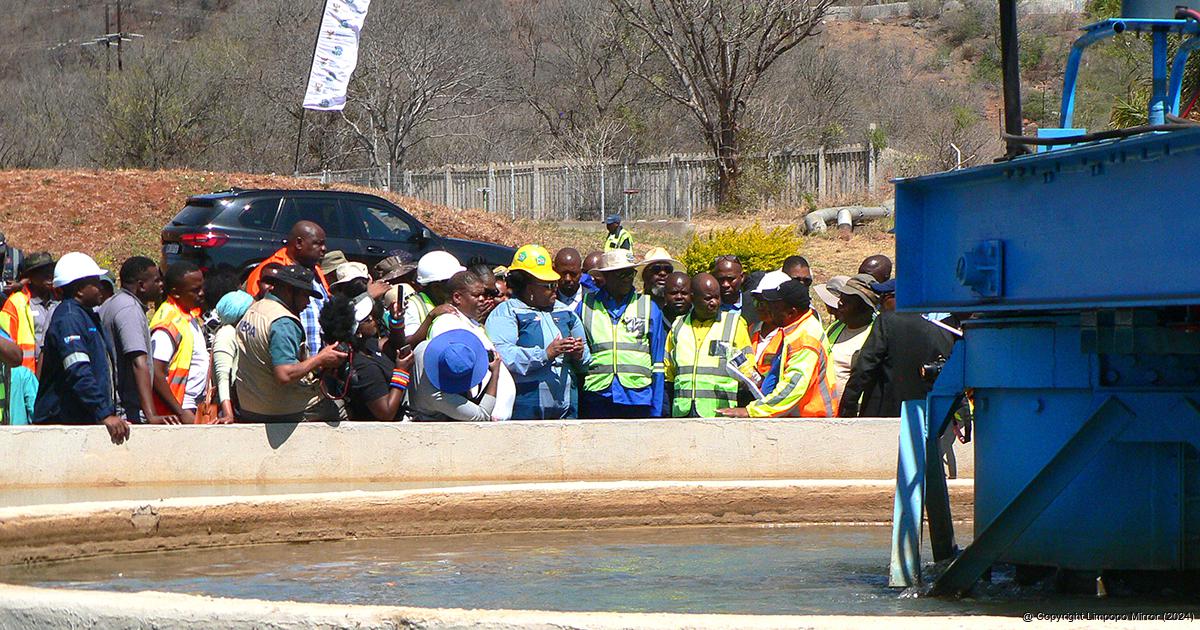

ADVERTISEMENT:

Minister of Water and Sanitation Pemmy Majodina and Deputy President Paul Mashatile went with a delegation to visit the Giyani Water Project in Limpopo on Friday. The project has been marred by delays and controversy for several years now. Photo: Bernard Chiguvare.
Only nine of 55 villages get water from multi-billion-rand project
Minister of Water and Sanitation Pemmy Majodina and Deputy President Paul Mashatile led a delegation to visit the Giyani Water Project last Friday (6 September).
The bulk-water project, which began in 2014 and was initially set for completion by 2017, has been fraught with controversy and delays, despite an estimated expenditure of R4 billion.
Resuscitated in 2021, the project is expected to eventually supply water to 55 villages in Giyani once completed.
Currently, only nine of the 55 villages in Giyani, Limpopo, receive water from the Giyani Water Project, according to Deputy President Paul Mashatile. "We have received reports that the remaining villages will receive water within two years, but we aim to accelerate the process," Mashatile said.
Mashatile, alongside Minister Majodina, visited the project to assess its progress. As chairperson of the special task team established to address water challenges nationwide, Mashatile’s visit was aimed at ensuring the project remains on track.
While some progress has been made, many villages in the Giyani area still face daily struggles in accessing tap water.
The Special Investigating Unit (SIU) has instituted a liability claim against three Lepelle Northern Water (LNW) board executives over a R1.9 billion loss suffered by the Department of Water and Sanitation, stemming from tender irregularities associated with the project.
The SIU found that the contract for the project was awarded irregularly and has since litigated to have it declared unconstitutional, invalid, and set aside. Additionally, the SIU's findings revealed that LNW's supply chain management processes were flawed and in violation of legislation.
During Friday's visit, Minister Majodina announced that investigations into fraud and mismanagement of funds related to the project were ongoing. She also noted that allegations about water from the project being diverted by a farming company were still being examined.
“The project was delayed due to alleged fraud, but while investigations are underway, we have decided to unblock the project, so that residents can receive water,” said Majodina.
Mashatile, meanwhile, promised that by November, 24 villages could be receiving water from the Giyani project. When asked about the timeline for the remaining villages, he responded, “Soon.” To ensure steady progress, Mashatile committed to stationing two water department officials in Giyani to monitor the project.
However, some residents voiced criticism of the ministerial visit, expressing doubts about its impact on the ongoing water crisis in their communities.
“I don’t think the visit will bring any change to the community,” said Rhulani Zita from Matsotsosela village. He noted that many residents in his village still had to purchase water, and those unable to afford it were forced to collect water from polluted rivers.
Mashatile and his delegation also visited Nhwakhuwani village, one of the villages now receiving water. Several residents confirmed to GroundUp that while they started receiving water a few weeks ago, the supply remains inconsistent. “We have to keep our drums full in case the water stops,” said Francis Tshabalala.
Date:14 September 2024
By:
Read: 469

ADVERTISEMENT

ADVERTISEMENT:

Sponsored Content
Maelula Tshifhire Day to celebrate 40 years of cultural promotion
The Maelula Tshifhire Traditional Dance Group will celebrate its 40th anniversary on Saturday, 21 September. The group, established in 1984, aims to promote the tshigombela, malende, and matangwa dances.

ADVERTISEMENT:

Recent Articles
-

Maelula Tshifhire Day to celebrate 40 years of cultural promotion
18 September 2024 -

Dr Maremela vho anḓadza bugu ya ngeletshedzo nga ha mbiti.
18 September 2024 By Silas Nduvheni -

Fhatuwani o takala u khethwa kha pfufho dza SATMA.
17 September 2024 By Elmon Tshikhudo -

Vho Owen da Gama vhari vha na pulane khulwane na thimu ya Vondwe XI Bullets.
16 September 2024 By Frank Mavhungu -

Vho Ravhura vho ṱhaphudza pfunzo dzavho kha vhudokotela ha pfunzo.
16 September 2024 By Silas Nduvheni

ADVERTISEMENT

Popular Articles
-

Vhavenda princess' case is set to break traditional stereotypes
03 August 2024 By Anton van Zyl -

Hillary Construction to rehabilitate old N1 through Musina
22 August 2024 -

Man dies in head-on collision near Gogobole
01 August 2024 By Kaizer Nengovhela -

From engineering dreams to fashion industry icon
25 August 2024 By Maanda Bele -

Dzanani 1 Taxi Association continues to block routes in Nzhelele
01 August 2024 By Maanda Bele -

Tracing the roots of the dreaded Panga Man back to Vhembe
24 August 2024 By Anton van Zyl -

Environmental groups unite to prevent township development
02 August 2024 By Andries van Zyl


